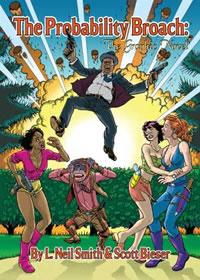
There are two essential ingredients that make up a good sci-fi story (apart from science and fiction); firstly using the ‘what if’ paradigm and, secondly, the expounding of a political, social, philosophical or spiritual concept. The most enduring sci-fi has used these as their basis, from Huxley’s Utopia to Orwell’s dystopia. Herbert’s Dune, Heinlein’s Stranger in a Strange Land and Asimov’s Foundation trilogy all had complex ideas expressed through fiction, that are a lot more stimulating than descriptions of space battles. L. Ron Hubbard went a bit too far with his ideas, turning his fiction into a very profitable religion, but it sure beats interminable book-signing tours.
The Probability Broach, by L. Neil Smith, was originally published as a novel in 1979, and went on to win a Prometheus Award, given annually by the check this link for more), but in a mixture of sci-fi and Chandleresque pulp fiction.
The graphic novel version of the story, published by Big Head Press, is drawn by Scott Bieser and brings all the concepts into an easily digestible format. The story starts with our hero, Edward ‘Win’ Bear, a detective in Denver, Colorado, investigating a murder that also attracts the attention of the Homeland Security. When his investigations lead him to a university he is chased by the government agents and accidentally passes through into a parallel world run on libertarian ideals, which he initially has trouble both understanding and accepting.
With this alternative world’s history almost matching that of the one he comes from, except everyone is free and happy, his confusion only deepens when key political events he knows went in a different direction (the ‘what if’ scenario). For the British reader a lot of this exposition will be meaningless, unless they have a reasonable knowledge of early American history, but the politics are universal. Whether they are tenable is another matter, given the level of social decay in the west and our perceived reliance on a central government. To my mind, the tenets of Libertarianism are workable, but only in an evolved or enlightened society free from selfish greed and avarice. In that world anarchy would work because humans would be masters of their own destinies and would not need intervention from ‘higher’ authorities.
My only misgiving with the story is the gun carrying philosophy, which does seem to bear the hallmarks of the NRA, but weapons have become such an integrated part not only of fiction but the world around us that it might seem a bit nit-picky on my part. As much as I enjoy a good, violent action film, that is where it should stay (as was demonstrated in the underrated Last Action Hero). My ideal world would be one of love, peace and non-violence. Having said that, the plot of the story does involve the bad guys trying to upset the established balance of equity by wanting to assert their authority by introducing not just a bigger gun but a nuclear bomb via the same portal our hero arrived through. It is up to ‘Win’ and his newfound friends to prevent this.
Apart from the aforementioned historical blanks and my own personal policy difference of opinion, this is a great story filled with thought-provoking ideals. The artwork is utilitarian, not having the wow factor that you get from some artists, such as David Mack or Geof Darrow, but it serves the story well without distracting from the message.
Check out the Big Head Press website, which has 42 pages of the comic online to get a taster. The book can be bought, on import, through the site.
